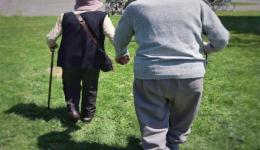Preventing Osteoporosis 人氣: 3619
 **Preventing Osteoporosis in Elderly: 6 Recommendations**
**Preventing Osteoporosis in Elderly: 6 Recommendations****Introduction:**
Osteoporosis is a common health issue among the elderly, characterized by reduced bone density and increased susceptibility to fractures. Proper prevention and management can help seniors maintain healthy bones and enhance their quality of life.
**1. Adequate Nutrition:**
- Proper Calcium Intake: Calcium is essential for bone health, and foods like milk, dairy products, legumes, nuts, among others, are good sources of calcium.
- Vitamin D Supplementation: Vitamin D helps promote calcium absorption, and seniors can obtain it through sunlight exposure, food, or supplements.
**2. Moderate Exercise:**
- Aerobic Exercise: Activities like walking, dancing, swimming, etc., in moderation, can help strengthen bone health.
- Strength Training: Weight-bearing exercises or resistance training can increase bone density and muscle strength.
**3. Smoking Cessation and Alcohol Limitation:**
- Smoking and excessive alcohol consumption may negatively impact the risk of osteoporosis, so quitting smoking or limiting alcohol intake is advisable.
**4. Posture Awareness and Fall Prevention:**
- Maintaining correct posture reduces bone stress and lowers the risk of fractures.
- Minimizing fall risks, including keeping the home environment tidy, using handrails, wearing proper footwear, etc.
**5. Regular Bone Density Checks:**
- Seniors should undergo regular bone density checks to assess their bone health, detect osteoporosis early, and initiate appropriate treatment.
**6. Medical Treatment and Medication Management:**
- For seniors diagnosed with osteoporosis, doctors may recommend treatment or specific osteoporosis medications.
- Seniors should adhere to their doctor's recommendations for medication intake, and be mindful of potential side effects and interactions.
**Conclusion:**
By following these recommendations, seniors can take proactive steps to prevent osteoporosis and maintain optimal bone health, thereby improving their overall well-being and quality of life.